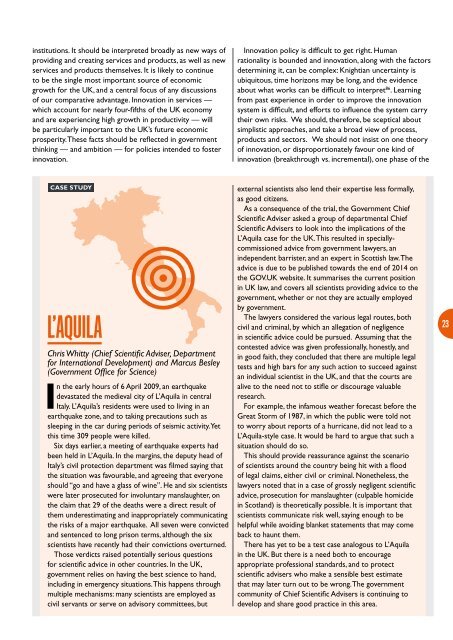14-1190b-innovation-managing-risk-evidence
14-1190b-innovation-managing-risk-evidence
14-1190b-innovation-managing-risk-evidence
You also want an ePaper? Increase the reach of your titles
YUMPU automatically turns print PDFs into web optimized ePapers that Google loves.
institutions. It should be interpreted broadly as new ways of<br />
providing and creating services and products, as well as new<br />
services and products themselves. It is likely to continue<br />
to be the single most important source of economic<br />
growth for the UK, and a central focus of any discussions<br />
of our comparative advantage. Innovation in services —<br />
which account for nearly four-fifths of the UK economy<br />
and are experiencing high growth in productivity — will<br />
be particularly important to the UK’s future economic<br />
prosperity. These facts should be reflected in government<br />
thinking — and ambition — for policies intended to foster<br />
<strong>innovation</strong>.<br />
Innovation policy is difficult to get right. Human<br />
rationality is bounded and <strong>innovation</strong>, along with the factors<br />
determining it, can be complex: Knightian uncertainty is<br />
ubiquitous, time horizons may be long, and the <strong>evidence</strong><br />
about what works can be difficult to interpret 86 . Learning<br />
from past experience in order to improve the <strong>innovation</strong><br />
system is difficult, and efforts to influence the system carry<br />
their own <strong>risk</strong>s. We should, therefore, be sceptical about<br />
simplistic approaches, and take a broad view of process,<br />
products and sectors. We should not insist on one theory<br />
of <strong>innovation</strong>, or disproportionately favour one kind of<br />
<strong>innovation</strong> (breakthrough vs. incremental), one phase of the<br />
CASE STUDY<br />
L’AQUILA<br />
Chris Whitty (Chief Scientific Adviser, Department<br />
for International Development) and Marcus Besley<br />
(Government Office for Science)<br />
In the early hours of 6 April 2009, an earthquake<br />
devastated the medieval city of L’Aquila in central<br />
Italy. L’Aquila’s residents were used to living in an<br />
earthquake zone, and to taking precautions such as<br />
sleeping in the car during periods of seismic activity. Yet<br />
this time 309 people were killed.<br />
Six days earlier, a meeting of earthquake experts had<br />
been held in L’Aquila. In the margins, the deputy head of<br />
Italy’s civil protection department was filmed saying that<br />
the situation was favourable, and agreeing that everyone<br />
should “go and have a glass of wine”. He and six scientists<br />
were later prosecuted for involuntary manslaughter, on<br />
the claim that 29 of the deaths were a direct result of<br />
them underestimating and inappropriately communicating<br />
the <strong>risk</strong>s of a major earthquake. All seven were convicted<br />
and sentenced to long prison terms, although the six<br />
scientists have recently had their convictions overturned.<br />
Those verdicts raised potentially serious questions<br />
for scientific advice in other countries. In the UK,<br />
government relies on having the best science to hand,<br />
including in emergency situations. This happens through<br />
multiple mechanisms: many scientists are employed as<br />
civil servants or serve on advisory committees, but<br />
external scientists also lend their expertise less formally,<br />
as good citizens.<br />
As a consequence of the trial, the Government Chief<br />
Scientific Adviser asked a group of departmental Chief<br />
Scientific Advisers to look into the implications of the<br />
L’Aquila case for the UK. This resulted in speciallycommissioned<br />
advice from government lawyers, an<br />
independent barrister, and an expert in Scottish law. The<br />
advice is due to be published towards the end of 20<strong>14</strong> on<br />
the GOV.UK website. It summarises the current position<br />
in UK law, and covers all scientists providing advice to the<br />
government, whether or not they are actually employed<br />
by government.<br />
The lawyers considered the various legal routes, both<br />
civil and criminal, by which an allegation of negligence<br />
in scientific advice could be pursued. Assuming that the<br />
contested advice was given professionally, honestly, and<br />
in good faith, they concluded that there are multiple legal<br />
tests and high bars for any such action to succeed against<br />
an individual scientist in the UK, and that the courts are<br />
alive to the need not to stifle or discourage valuable<br />
research.<br />
For example, the infamous weather forecast before the<br />
Great Storm of 1987, in which the public were told not<br />
to worry about reports of a hurricane, did not lead to a<br />
L’Aquila-style case. It would be hard to argue that such a<br />
situation should do so.<br />
This should provide reassurance against the scenario<br />
of scientists around the country being hit with a flood<br />
of legal claims, either civil or criminal. Nonetheless, the<br />
lawyers noted that in a case of grossly negligent scientific<br />
advice, prosecution for manslaughter (culpable homicide<br />
in Scotland) is theoretically possible. It is important that<br />
scientists communicate <strong>risk</strong> well, saying enough to be<br />
helpful while avoiding blanket statements that may come<br />
back to haunt them.<br />
There has yet to be a test case analogous to L’Aquila<br />
in the UK. But there is a need both to encourage<br />
appropriate professional standards, and to protect<br />
scientific advisers who make a sensible best estimate<br />
that may later turn out to be wrong. The government<br />
community of Chief Scientific Advisers is continuing to<br />
develop and share good practice in this area.<br />
23


